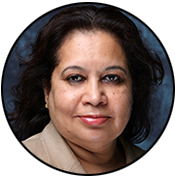Solving Common Hematopathology Testing Challenges with Next-Generation Sequencing
FREE Webinar
Held Wednesday, August 12
Now a Streaming Webinar
Hematological malignancies are complex, heterogeneous disorders involving multiple recurrent somatic and germline mutations. For acute hematological malignancies, early diagnosis and personalized disease management remain serious challenges. Moreover, there is a growing need for reliable and timely detection of minimal residual disease (MRD) to improve overall clinical management for patients. Genomic biomarkers can provide valuable information to support these needs; however, current biomarker testing algorithms can involve multiple different modalities—often requiring laborious serial processes and time-consuming workflows. These challenges are further exacerbated by the growing number of biomarkers associated with hematological malignancies.
In recent years, next-generation sequencing (NGS) has emerged as a powerful tool for biomarker testing, owing its ability to rapidly and simultaneously interrogate multiple genomic aberrations from a single sample. This FREE webinar for laboratory leaders, with follow-up Q&A, will demonstrate how this technology can now be easily implemented, making it practical for in-house laboratories to quickly generate comprehensive molecular reports for routine clinical care.
Now a Streaming Webinar
Attend this 60-minute program, and you will:
- Understand the foundational principles of next-generation sequencing
- Gain awareness of the technology advancements that are enabling more labs to realize greater efficiency, reduced TAT, and increased sensitivity and specificity
- Learn the key applications and benefits of NGS for myeloid and lymphoid malignancy profiling
- Hear about the applications and benefits of immune repertoire sequencing for lymphoid disorders, such as ALL, CLL, and MM, and much more
Who should attend?
- Laboratory Directors and Lab Administrators
- Hospital Administrators
- Pathologists
- Hemato-pathologists and Hemato-oncologists
Your registration includes:
- A site license to attend the webinar. Invite as many members of your team as you would like!
- The opportunity to pose specific questions, and connect directly with the panel, during a Q&A session
With your attendance of this FREE webinar, you will learn how NGS can complement your existing laboratory workflows, while providing a powerful new approach for rapidly generating comprehensive molecular data.
Hear the speakers’ own perspectives and insights on NGS applications for hemato-oncology, including DNA and RNA profiling using gene panels for myeloid and lymphoid malignancies, as well as immune repertoire sequencing for clonality assessment, MRD detection, and somatic hypermutation analysis of lymphoid samples. Then, pose your specific questions during the Q & A.
Now a Streaming Webinar
Sponsored by:
Hosted by:

Your Panel:

Parth Shah, MD
Fellow, Hematology & Oncology
Dartmouth-Hitchcock
Lebanon, NH
Dr. Shah is an Instructor at the Geisel School of Medicine at Dartmouth and a Fellow in Hematology and Oncology at the Norris Cotton Cancer Center. He has extensive experience in the field of genomic diagnostics and has published extensively in assay development and clinical utilization for molecular biology with a specific expertise in next generation sequencing. He has been involved in designing algorithms involving single cell genomics as well as plasma-based assays for next generation sequencing which are now used for clinical samples globally. His current research focuses on establishing a standardized genomic data storage and visualization system for cancer and germline genomics.

Carl Morrison, MD, DVM
SVP, Scientific Development
and Integrative Medicine
Roswell Park Comprehensive Cancer Center
Buffalo, NY
Dr. Morrison joined RPCCC in 2007 and is currently SVP of Scientific Development and Integrative Medicine; Director of the Pathology Resource Network; Clinical Chief, Dept. of Pathology and Laboratory Medicine; Director, Div. of Molecular Pathology, and Professor of Oncology. Prior to Roswell Park, Dr. Morrison spent 5 years at The Ohio State University Medical Center. He is a board-certified pathologist who has an interest in both clinical and research areas.

Sheila Sait, PhD
Assistant Director & Research Coordinator
Clinical Cytogenetics Laboratory
Roswell Park Comprehensive Cancer Center
Buffalo, NY
Dr. Sait is a classically-trained cytogeneticist with more than 30 years of experience in cancer cytogenetics. Her interests include cytogenetic and molecular cytogenetic analysis of hematologic malignancies and some solid tumors. Dr. Sait has faculty appointments at the State University of New York at Buffalo and at RPCCC. She serves as reviewer to several scientific journals and has authored and co-authored over 240 publications, book chapters, and abstracts.



